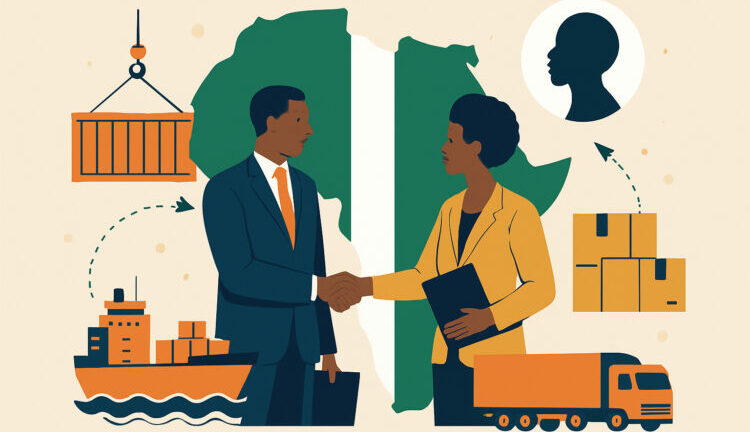By Kester Kenn Klomegah*
MOSCOW | 11 October 2025 (IDN) — In this insightful interview, Professor Jude Osakwe, Continental Chairman of the Nigerians in Diaspora Organization (NIDO) Africa, highlights the rapidly shifting global trade landscape and the renewed focus on intra-African trade. This necessitates convening the Regional Trade Conference — ‘Made-in-Nigeria’ — in Dakar, Senegal, from 24–28 November 2025.
Professor Osakwe underlined a key message: while multilateral trade frameworks are increasingly fragmented, this development presents a strong opportunity to strengthen the African Continental Free Trade Area (AfCFTA). Consequently, Nigeria’s NIDO-Africa “Made-in-Nigeria” initiative aims to advance the country’s trade aspirations within the framework of the African Union’s Agenda 2063.
Below are excerpts from the interview.
Q: In the context of geopolitical shifts, how would you characterise and argue that the forthcoming event ‘Made-in-Nigeria’ is an integral aspect of intra-African trade policy under the African Union?

Professor Jude Osakwe: The “Made-in-Nigeria” event represents a critical convergence of continental trade ambitions and national industrial capacity at a pivotal moment in global economic realignment. As multilateral trade frameworks fragment and regional blocs strengthen, Africa’s response through the AfCFTA signals our determination to chart an independent economic trajectory.
Nigeria, as Africa’s largest economy and most populous nation, occupies a unique position in this continental project. The initiative directly advances the AU’s Agenda 2063 objectives by showcasing indigenous manufacturing capacity, promoting value addition within the continent, and demonstrating that intra-African trade can be based on productive capability rather than raw material exchange.
This event addresses a fundamental challenge: intra-African trade currently represents only 15–18% of the continent’s total trade—far lower than in other regions. By highlighting Nigerian-manufactured products—from processed foods and pharmaceuticals to technology and creative industries—we aim to demonstrate that African nations can be both producers and consumers within a genuinely integrated market. This is not theoretical policy; it is the AfCFTA in action.
Q: Under NIDO-Africa’s leadership, what are the expectations for this event? Despite its intra-African focus, are foreign traders and importers among your target participants?
Osakwe: NIDO-Africa’s leadership brings a distinctive diaspora perspective. We understand both African productive capacity and global market demands, having operated at this intersection for decades.
Our expectations are layered. Primarily, we seek to facilitate meaningful intra-African commercial connections—bringing together procurement officers, distributors, retail chains, and manufacturing firms to create sustainable trade corridors rather than one-off transactions.
However, foreign traders and importers are indeed complementary priorities. Nigeria’s economic growth requires both expanded African market access and continued global trade partnerships. Foreign importers—especially from the U.S., Europe, Asia, and the Middle East—play strategic roles by:
- Bringing capital, technology transfer, and global best practices
- Forming joint ventures that enhance Nigerian productive capacity
- Providing access to markets beyond Africa’s current absorption capacity
- Validating the quality and competitiveness of Nigerian products
Our approach is not “either/or.” We are positioning Nigeria as a continental manufacturing hub that serves African markets while maintaining robust global trade links. Foreign traders who engage now gain preferred access to Africa’s 1.3 billion-person market through a Nigerian gateway.
Q: How would you assess the current level of economic cooperation between Nigeria and major partners such as the United States, China, India, and Russia?
Osakwe: Nigeria maintains strategically important but distinct relationships with each of these powers:
United States: Engagement centres on energy, security, and development cooperation. The unrealised potential lies in non-oil sectors—technology, pharmaceuticals, agribusiness, and creative industries. The key challenge is moving beyond resource extraction to industrial partnership.
China: Now Nigeria’s largest trading partner and infrastructure financier, especially in railways and power. However, trade imbalances persist. The opportunity lies in technology transfer agreements and joint ventures that enhance Nigerian manufacturing rather than dependency on imports.
India: Often underestimated, India maintains deep connections across the pharmaceutical, ICT, and automotive sectors. Its model of two-way trade and investment represents perhaps Nigeria’s most balanced partnership.
Russia: Engagement remains limited but is expanding, particularly in energy and mineral resources. Recent geopolitical shifts open opportunities for broader cooperation, though infrastructure and finance linkages remain underdeveloped.
These relationships collectively demonstrate Nigeria’s multi-alignment strategy in a multipolar world. However, Nigeria often acts as a commodity supplier and finished goods importer—an imbalance the ‘Made-in-Nigeria’ initiative seeks to correct.
Q: What are the landmark achievements of the African Growth and Opportunity Act (AGOA) for Nigeria?
Osakwe: AGOA, launched in 2000, is America’s most sustained trade initiative toward Sub-Saharan Africa. Its results for Nigeria are mixed.
Achievements include:
- Billions in petroleum exports facilitated through duty-free access
- Improved market access for cocoa, cashew, and sesame products
- Modest textile and apparel growth
Unrealised potential stems from:
- Low awareness among manufacturers
- Certification and compliance barriers
- Infrastructure bottlenecks
- Limited value addition in export sectors
The lesson is clear: market access must be paired with productive capacity. Countries like Kenya and South Africa maximised AGOA through export-ready infrastructure. Nigeria’s current industrial policies and the ‘Made-in-Nigeria’ initiative aim to capture AGOA’s untapped potential before its current phase ends in 2025.
Q: China now offers tariff-free access to African products. Can this support the ‘Made-in-Nigeria’ program?
Osakwe: China’s tariff-free policy for the least-developed countries—and its broader Global South outreach—offers both opportunities and challenges.
Opportunities:
- Preferential access to the world’s second-largest consumer market
- Potential synergies with existing Chinese-funded infrastructure in Nigeria
- Industrial scaling for export-oriented sectors like agriculture and light manufacturing
Challenges:
- Overwhelming competition from the Chinese manufacturing efficiency
- Persistent trade imbalance (imports far exceed exports)
- Risk of deindustrialisation without protective policy measures
The strategic path forward involves negotiating technology transfer, joint ventures, and local content requirements. The goal is to ensure Chinese engagement strengthens Nigeria’s productive base, not dependency.
Q: What opportunities and incentives exist for importers and entrepreneurs engaging with Nigeria?
Osakwe: The “Made-in-Nigeria” event highlights several high-value sectors:
- Processed agriculture – Cocoa powder, cassava flour, spices
- Pharmaceuticals – WHO-certified products at competitive costs
- Creative and digital services – Nollywood, software, and music exports
- Solid minerals – Tin, gold, lithium, and other critical materials
- Engineering and construction – Growing African project delivery capacity
Incentives include:
- NEPC export grants and trade mission support
- Export Processing Zone benefits (tax relief, duty-free imports)
- AfCFTA preferential rules of origin
- NIDO-Africa diaspora facilitation for partnerships and due diligence
- Competitive pricing due to currency adjustments
With concurrent investments in power, transport, and digital infrastructure, early entrants stand to benefit from Nigeria’s reform momentum.
Q: Would you agree that foreign players are competing for opportunities due to Nigeria’s conducive business climate and stability?
Osakwe: Competition for Nigerian opportunities is intense—but not simply because the environment is already ideal. It’s driven by market scale, resource wealth, and strategic positioning.
Nigeria faces real challenges:
- Infrastructure deficits and high logistics costs
- Regional security concerns
- Regulatory complexity
- Forex management issues
- Policy uncertainty during transitions
Yet these same factors create high entry barriers that protect long-term investors once they establish a foothold. Firms that master Nigeria’s complexities today gain durable competitive advantages tomorrow.
NIDO-Africa’s role is to bridge potential and reality—reducing information asymmetry, building credible partnerships, and guiding investors through Nigeria’s evolving business terrain.
We are not claiming perfection. We are demonstrating that strategically sophisticated investors who engage now—through the ‘Made-in-Nigeria’ platform—can help shape, and benefit from, Africa’s largest emerging market.
Kester Kenn Klomegah is a veteran journalist, policy researcher, and business consultant. His work focuses on international relations, geopolitics, and Africa’s economic development in the context of global power shifts. His writing regularly appears in leading international publications. [IDN-InDepthNews]
AI-generated image as conceived by Nastranis

